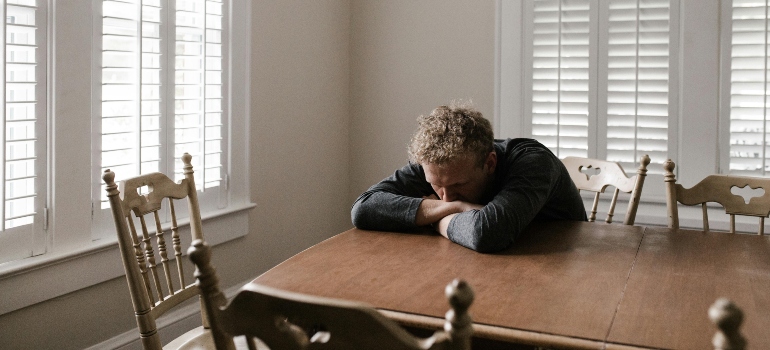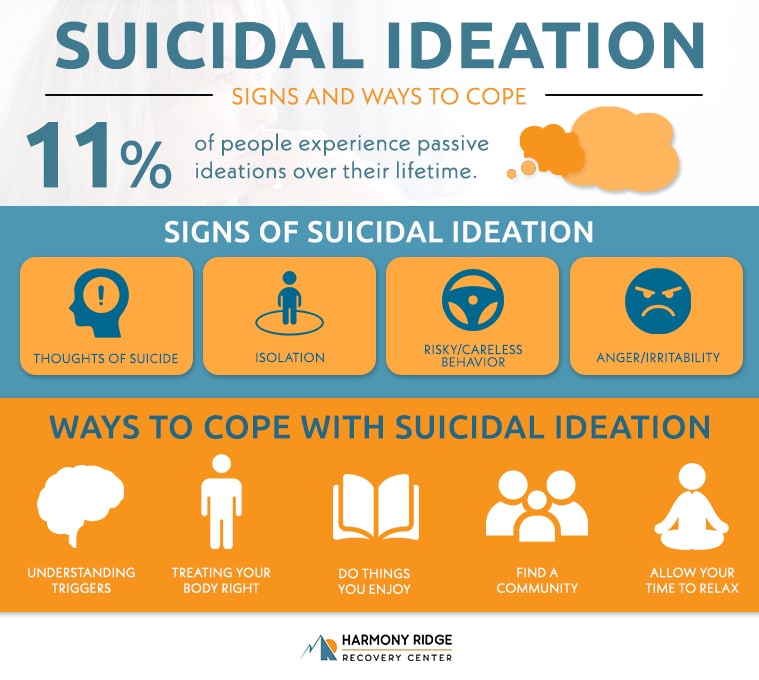Suicide was the tenth leading cause of death in the United States in 2019, accounting for twice as many deaths as homicides. Suicidal ideation is the largest warning sign of the potential to commit suicide. Suicidal ideation is the contemplation of suicide or the desire to commit suicide. However, there are different forms of suicidal ideation, and they may manifest in different ways. It is important to recognize and address suicidal ideation to improve your quality of life and manage your emotions for your overall mental health.
Passive Suicidal Ideation vs Active Suicidal Ideation
Passive suicidal ideation is the contemplation of suicide without having a plan to carry it out. These thoughts often manifest in less direct ways, such as wishing to die in a car crash or work accident without ever expressing the intent to commit suicide.

Meanwhile, active suicidal ideation is the contemplation of suicide while also having a plan to carry out the act. Active suicidal ideation is more dangerous because it demonstrates that a person is actively hoping to commit suicide.
Although there are different forms of suicidal ideation, passive suicidal ideation vs active suicidal ideation is still a difficult debate as passive suicidal thoughts can easily turn into active thoughts. Therefore, you should take both conditions seriously. If you or a loved one think you may be experiencing either of these conditions, you should discuss them with a doctor or mental health professional.

Signs of Suicidal Ideation
Studies show that approximately 11% of people experience passive ideations over their lifetime. If you think you or a loved one is experiencing suicidal ideations, there are a few indicators to look for:
- Wishing to be no longer alive or having passive suicidal thoughts, like thinking about committing suicide without having a plan in mind for how to do it.
- Isolating from family or friends.
- Expressing feelings of hopelessness
- Being less careful or considerate in decision-making and engaging in risky behavior, like using drugs or reckless driving.
- A disinterest in discussing the future.
- A pattern of mood swings or negative emotions like anger or irritability.
- Making comments about no longer being alive.
If you or a loved one is experiencing any of these passive suicidal ideation indicators, you should talk to your doctor. You and your doctor will be able to discuss it more deeply while considering how long you’ve experienced these thoughts, your mental health history, and whether you have a plan to act on your thoughts.
Causes of Passive Suicidal Ideation
People may experience passive suicidal ideations for a variety of reasons; it isn’t a one-size-fits-all condition. Many risk factors can increase the likelihood of experiencing passive suicidal feelings or thoughts. You should pay extra attention to your emotions and consider seeking support if you or a loved one experiences any of the following risk factors:
- Having a mental health condition like depression, bipolar disorder, or anxiety
- Experiencing a crisis like the loss of a loved one
- Undergoing increased stress due to work or family circumstances
- Struggling with financial difficulties or uncertainty
- Feeling frequent loneliness
- Having a chronic physical illness like cancer or diabetes
- Enduring chronic pain
- Suffering a traumatic brain injury
- Having a family history of suicide

Although these are common causes and risk factors, this is not an exhaustive or exact list. Other social factors like having been in the military or living in a rural area can also increase the likelihood of suicidal ideation.
Regardless of your experience, you should consider these risk factors or be conscious of factors in your life that may be leading to negative emotions. In any moment of increased stress, you should ensure that you have support and proper strategies to help you cope.
Treatment for Suicidal Ideation
Even if there is no plan in mind, passive suicidal ideation should be addressed quickly and with quality care. Any negative feelings or suicidal thoughts are dangerous. Suicidal thoughts also decrease your quality of life. There are several treatment options that you can discuss with a mental health professional to find the right one for you. Some treatment options include the following:
- Psychotherapy – psychotherapy is the strategy of discussing suicidal ideations with a therapist to identify the causes of them and find ways to address them.
- Medications – Medications can help address underlying causes of suicidal ideation like depression, anxiety, or other mental health disorders. Working with a psychiatrist can help you decide if medications like anti-depressants would benefit you.
- Family therapy and education – This form of therapy involves loved ones in the treatment process. This is helpful in cases where a difficult family situation may be an underlying cause of negative emotions or when the family should have a role in the treatment plan.
- Changing habits – Changing habits may also be an effective treatment plan. Sometimes having better strategies to improve sleep and eating habits and manage stress can be a strong enough treatment on its own.
- Substance use treatment – This form of treatment can be helpful if suicidal thoughts are the cause of, or are leading to, a pattern of drug or alcohol abuse.
When to Contact Medical or Emergency Help While Experiencing Suicidal Ideations
Passive suicidal ideation treatment may look different for everyone, which is why it is important to have a conversation with your doctor or a qualified mental health professional to determine which treatment is right for you. Regardless, you or your loved ones should have a proper support system when undergoing treatment to help manage the natural ups and downs. If passive thoughts start to become active and you or a loved one develop a plan to commit suicide, then contact 911 or find a local crisis center immediately. There is plenty of help to overcome negative emotions so that you can live your life to the fullest.

Ways to Prevent or Cope with Suicidal Ideation
Although the risk of passive suicidal ideation may not be as high as active thoughts, If you or a loved one are experiencing suicidal thoughts, there are several ways to take care of yourself and help you manage them. That way you can experience each day more positively:
Understanding Triggers
Finding what factors in your life cause feelings of hopelessness may help you better address or avoid them. For example, if you are struggling with substance use or a difficult relationship, you may be able to find ways to move past them. On the other hand, if there are more difficult factors to avoid, like a stressful job or a traumatic life event, then finding the right person to talk to can help you express some of your emotions.
Treat Your Body Right
Physical health and mental health often go hand-in-hand. Life can be busy and factors like a healthy diet and a good night’s sleep can easily become deprioritized as a result. Thus, making time for consistent, nutritious meals and getting at least eight hours of sleep a night will provide your body with the energy it needs to function properly. Exercise also has a positive impact on your mental health while making you feel better physically as well. By taking care of your body, you can often feel more mentally refreshed and comfortable more frequently.
Do Things You Enjoy
Being able to cope with negative thoughts and emotions is easier when you are able to replace them with positive ones. Therefore, it is necessary to find time each day for activities that you enjoy. Whether you enjoy being social or taking time for yourself, you should provide yourself with the right space by going out with friends or scheduling alone time. It is also beneficial to have hobbies that give you time away from stressors in life. Activities like hiking, art, and playing an instrument are all great ways to bring positive emotions and enjoyment into your day.
Find a Community
Humans are social beings, so having people to lean on and talk to is crucial. Finding people that you enjoy being around will help you embrace positive emotions over negative ones. Engaging in community activities like volunteer work or events can also help provide you with a stronger sense of fulfillment and happiness.
Allow Yourself Time to Relax
Work, relationships, and other commitments can lead to a lot of stress. Thus, it’s important to find time throughout the day to prioritize relaxation. Meditation, breathing exercises, and light exercises can all help you calm your mind and body. Having ways to confront stress is highly beneficial in helping you overcome it.

Passive Suicide Ideation and Substance Abuse
Individuals who experience passive suicide ideation often endure significant exhaustion with life, desiring an escape from their suffering without seeking methods to end their lives. Therefore, substance abuse may start as an attempt to self-medicate. People who face continuous emotional distress might turn to substances that provide temporary relief or a brief sensation of happiness, acting as a short-lived escape. This relief, however, is fleeting and can lead individuals into a cycle of dependence and further despair. Dependence on these substances for relief can lead to addiction, exacerbating the initial issues for several reasons:
- Physical and mental health impact: Substance abuse harms both physical and mental health, potentially worsening the symptoms it was meant to mitigate. This can increase feelings of despair and intensify passive suicide ideation.
- Social isolation: Regular substance use may distance individuals from their social support network, amplifying feelings of solitude and entrenchment in suicidal ideation.
- Decision-making impairment: Substance use can impair decision-making abilities and lower inhibitions, possibly shifting passive thoughts towards more active considerations.
- Increased shame and guilt: Engaging in a cycle of substance use for escape, followed by worsened physical and emotional states, can heighten feelings of shame and guilt, reinforcing the ideation.
Substance Abuse Treatment
When it comes to treating both substance abuse and passive suicide ideation, it’s a bit like tackling two big problems at the same time, and there are several ways to go about it. Let’s look at three main types of treatment:
- Inpatient treatment: This is when someone stays at a treatment facility for a while. It’s a safe space where professionals help them 24/7. This can be really helpful for getting a strong start on the road to recovery, especially if their situation is really tough. It’s like pressing pause on the usual stresses and focusing entirely on getting better.
- Dual diagnosis treatment: This one is super important because it recognizes that someone might be dealing with both substance abuse and mental health issues, like passive suicide ideation. It’s like understanding that the two problems are tangled up together, and to truly help someone, you need to address both at the same time, with therapy, support, and sometimes medication.
- Medication-assisted treatment (MAT): This involves using certain medicines to help ease cravings for substances and manage withdrawal symptoms, making it easier to focus on recovery. For the passive suicide ideation part, doctors might prescribe medications to help with depression or anxiety, tackling the problem from both ends.

Therapies for Passive Suicide Ideation and Addiction
Rehab centers in West Virginia offer various therapies that can treat both issues at the same time. These include:
- Cognitive behavioral therapy (CBT): This helps people change the negative thought patterns that contribute to their substance use and suicidal thoughts.
- Dialectical behavior therapy for addiction: A type of CBT that teaches coping skills to manage emotions and reduce self-destructive behaviors.
- Motivational interviewing for substance abuse: This boosts someone’s motivation to change by helping them find their own reasons for wanting to get better.
- Group therapy for addiction: Offers support and understanding to others facing similar challenges, showing that no one is alone in their struggles.
- Family Therapy for Addiction: Helps improve relationships and support systems, which is crucial for recovery.
Find Your Path to Happiness with Harmony Ridge
Although having strong coping mechanisms will lead to consistent progress, you still should not tackle suicidal ideations alone. Having a counselor or mental health specialist to talk to and discuss your life experiences with will make a positive difference and help enhance your daily life. If you have more questions about passive suicidal ideation or are in need of mental health and/or substance use assistance, Harmony Ridge Recovery Center can help. You and your loved ones should never have to work through negative thoughts and emotions alone. We provide personalized, evidence-based treatments and quality care to help our members thrive. We believe that everyone deserves a strong support system to live their lives happily and to their full potential. Contact us here at Harmony Ridge Recovery Center for more information.
References:
[1] https://www.nimh.nih.gov/health/statistics/suicide



